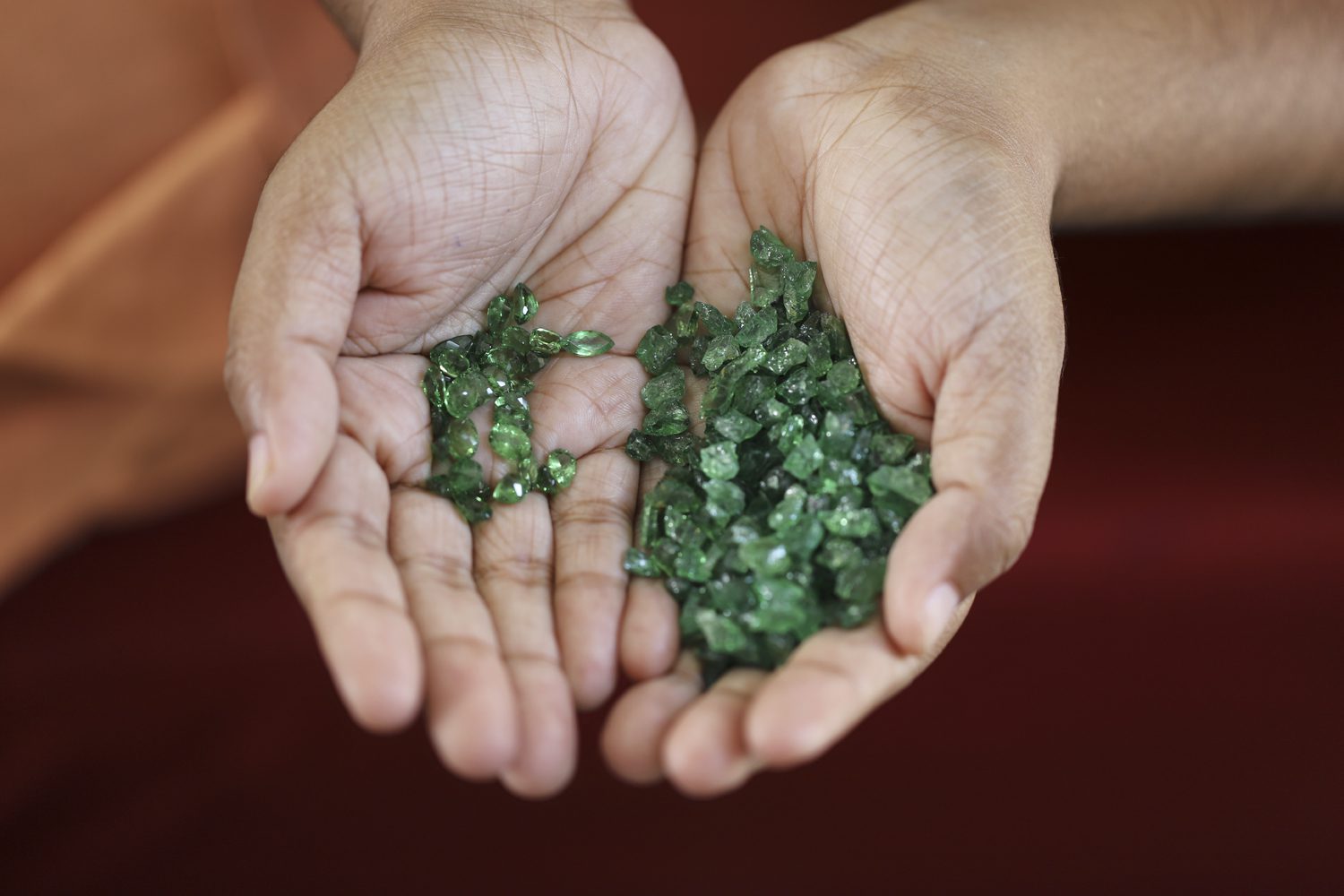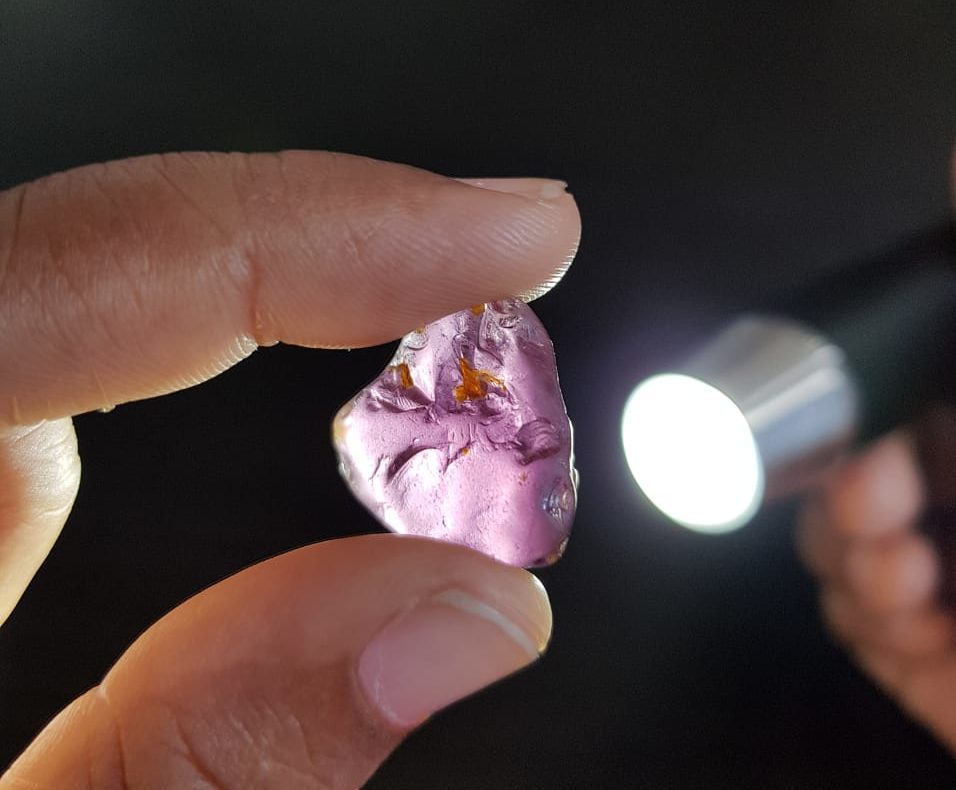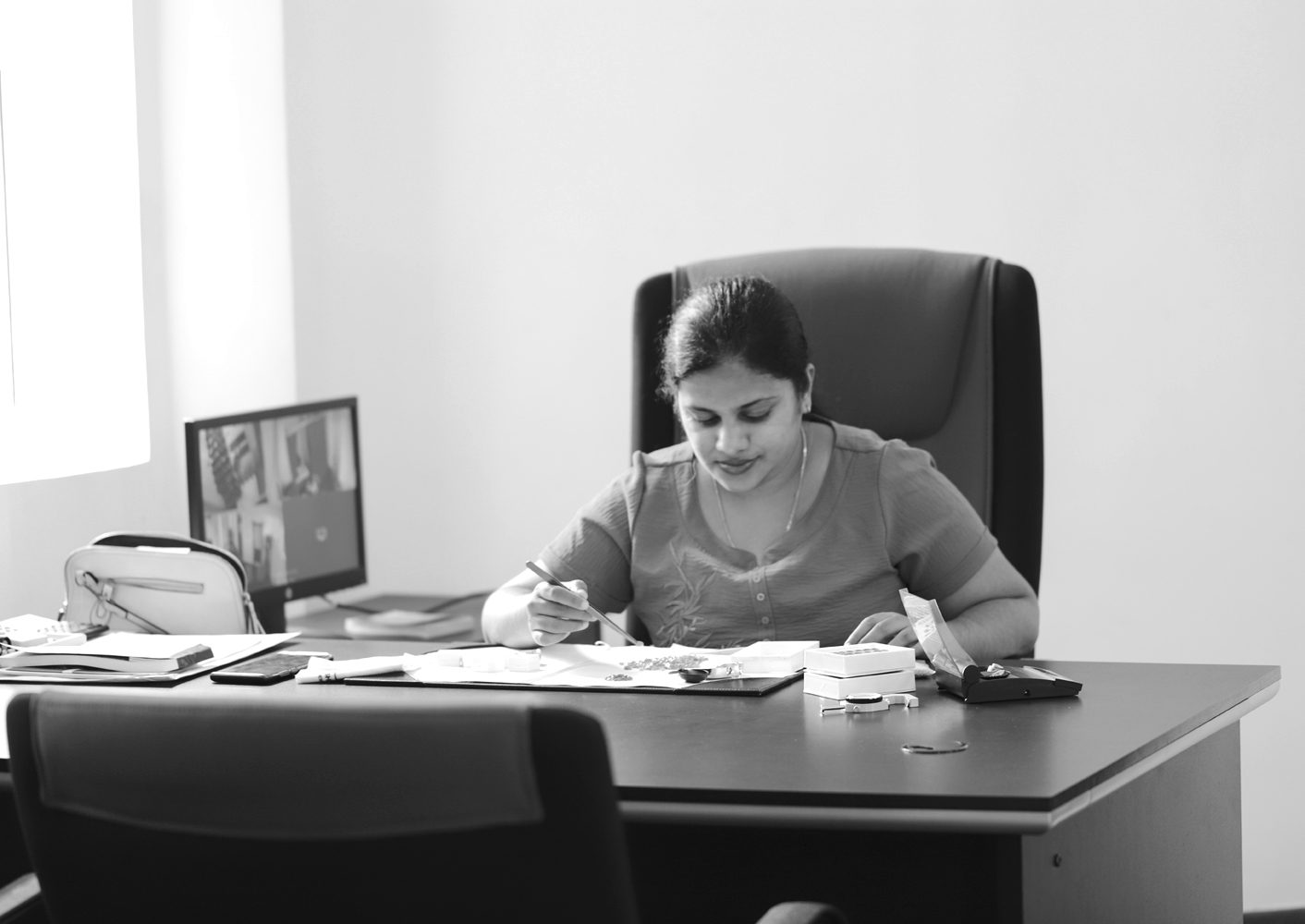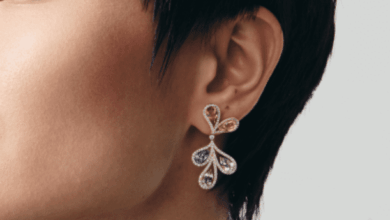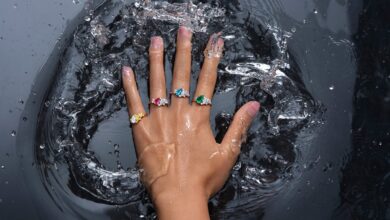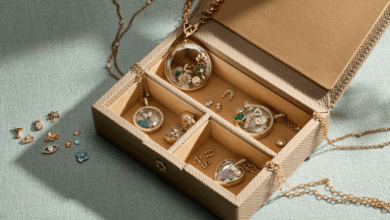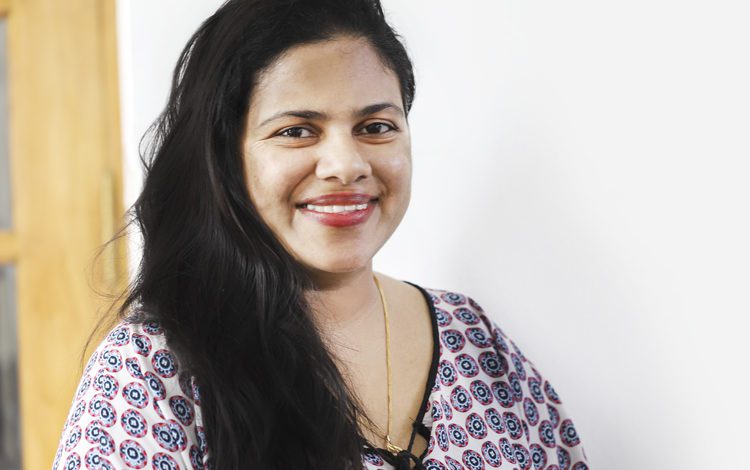
Register to get 1 free article
Reveal the article below by registering for our email newsletter.
Want unlimited access? View Plans
Already have an account? Sign in
This year’s International Women’s Day on 8 March brought renewed attention to issues of equality, women’s rights and the treatment of women across the globe. It has also been a time to celebrate the incredible achievements of women in every corner of the world, and in every field of work. For some women, however, their own success has been challenged by patriarchal prejudice and old-school attitudes, with some working against the odds to become rising stars in fields that were once dominated by men.
One such woman is Elavella Gamaethige Maneesha Humphrey, Sri Lanka’s first and only female gem buyer. Now a lead buyer for Taylor and Hart, Maneesha is a well-respected and revered figure in the gem and jewellery industry, known for her knack for sourcing the best sapphires in a range of colours from the Ratnapura region in Sri Lanka. From humble beginnings, she defied the odds to forge her own path in a male-dominated world. Jewellery Focus sat down with Maneesha to find out more about her journey to the top, and the changing attitudes towards women in the jewellery industry.
Breaking tradition
While Maneesha’s interest in the gem industry started at a young age, it was her desire to forge her own way in life and become an independent, working woman that would see her embark on this unprecedented career journey. Whilst born into a traditional household, Maneesha knew she was destined for more than household duties and motherhood.
In order to achieve this freedom, Maneesha first needed to break away from her traditional family. “I got married very young, at only 18,” says Maneesha. “Because I came from a very traditional family, the only way for me to get out of that environment and break away from my father’s ruling was to get married. I married the boyfriend I had had since I was 15 years old, and there was no hesitation – I just wanted to get out.”
Maneesha notes that Sri Lankan marriage still involves the dowry, whereupon the bride’s father will pay the husband in property, gifts or money in exchange for their daughter. Rather than be seen as a commodity, however, Maneesha “wanted to prove to my husband that I didn’t come without any independence”.
She says: “I wanted him to know that I’m not just a possession, I’m not just any other Sri Lankan girl. I didn’t want to end up with the same family background that I saw in my childhood, and I really didn’t want a man controlling me in the next part of my life. It was important for me to not rely on a man. I knew I wanted to explore the world and make my own way in life.”
After their marriage, the couple briefly moved to the Middle East, where Maneesha fell pregnant three months later and gave birth to her son at the age of 19. “It was, at that time, not what I wanted, but I happily accepted my son,” she says. “But it was at that moment that I became more serious with life, and I wanted to set goals. It really was a starting point for me and turned everything upside down. I wanted my son to have everything I didn’t have when I was a child, and I wanted to be able to provide for him, and for him to be proud of me.”
Men and gems
Maneesha returned to Ratnapura, Sri Lanka, where she embarked on her search for work of any kind. It was here that her pioneering career in the gem industry would soon blossom, but as a solitary woman in a male-dominated environment, her beginnings did not come without barriers. “I always wanted to do something different, and I had always liked gems. I found I had always been drawn to them,” says Maneesha. “Ratnapura, however, is a very rural and traditional area. As a woman, you wouldn’t even walk through the gem market there because it was just full of men.”
At any given day there would be at least 400 to 500 men at the gem market, she notes, adding that only 10% of these men were actually operating the stalls. “The rest of them were just standing around in the road. It could seem very intimidating. If a woman walked through these crowds, the men would just stop what they were doing, and stare,” she says. “They stare at you from head to toe or whistle or ask ‘Hey, where are you going?’. So as a woman, you really needed to have some guts. It was easy to feel vulnerable, or feel that you didn’t have any real power in that world.”
When Maneesha told her family of her ambition to work with gems, she remembers her father laughing at her, and calling her husband names. “More than me, who suffered most was my husband. Even now, after I’ve been in the industry for 11 years, he is still constantly belittled and asked why he isn’t the one with a ‘proper job’, or asked why he is the one staying home all day. And I feel so bad because he looks after our children, and he supports me. I feel so much love and respect for my husband for tolerating all of this more than I do.”
“Except for my husband, who knew everything about me and was this great support, my father and many of my family members didn’t think I would survive in the industry,” she says. “They thought this because the industry was full of men, and they thought if I went in there the men would try to flirt with me and I’d find someone richer. People had that mindset – not only not trusting what I would do with gemstones and in my career, but, as is still the case in Sri Lanka, just seeing a woman as a sex object. It’s very sad.”
She adds: “Many still did not accept what I wanted to do, or the fact that I was good at what I did. My brother-in-law, for example, was a very traditional, narrow-minded person, and he was also a gem merchant. He was so against me entering the gem industry, and didn’t think it was the right place for a woman. There was absolutely no faith in my abilities at all. Instead I was laughed at.”
Defying the voices of others, Maneesha forged ahead with her ambition, and soon found her break when she met an American company (which she requested not be named in this article) that had come to Ratnapura to buy gems to export. “When I first met them, I was still looking for a way into the industry. Luckily, they were looking for somebody to join their team who could speak English. In Ratnapura at that time, there were not many people who could speak English, but luckily my English was better than many.”
She says: “I remember them telling me: ‘Maneesha, you are more than what you think you are’. They then asked me if I would like to become a partner, and work in the gem industry with them. I remember hesitating. It was a big step, especially for a woman at that time. But then I remember the question they asked. They asked me: ‘do you want to make a difference, or do you want to stay where you are?’”
Prejudice and defiance
Maneesha accepted the offer, in a move that, at the age of 25, made her the very first female gem buyer in the country. With this pioneering move, though, came unwanted attention, prejudice and intimidation. “I remember when I first started working for them and we went to the gem market, all these men stopped what they were doing and started staring at me. They made lewd comments and intimated me. At that point I thought ‘oh no, am I doing the right thing?’.”
On that first day, Maneesha remembers returning swiftly to her car and “hiding there for a long time”. “But then I asked myself, ‘What the hell are you doing? How are you going to make a difference? What are you afraid of? And I told myself ‘Ok, so these men are staring at you – just stare back at them!’ That is the moment I got out of the car with more courage. I just started to purchase and I never looked back.”
From that moment onwards, Maneesha recalls feeling a special connection between herself and the sapphires found across Ratnapura’s gem markets, with a skilled eye for sourcing high-quality gems. Maneesha started to venture beyond Ratnapura in search of these gems, however. “I was more comfortable buying in different towns where people did not know me, than being around people who knew me,” she says. “I felt like they would not judge me, and I could be a different person. It made me feel I could build my identity as a gem buyer, and not just have my identity be the Maneesha that people knew from home.”
After a few months of working with the American company, Maneesha was already recognised as a skilled buyer. “They knew I had good knowledge of gemstones, and even as the only woman, they accepted me.” After a few months in the industry, Maneesha also found that the unwanted attention from men in the market began to die down, and attitudes towards her, as both a woman and a professional, were gradually shifting. “I think it was really down to the way I behaved,” she says. “It’s the way you give them the message of what you want to do, and show that you are determined and independent.”
Maneesha would still, however, face prejudice along the way. Whilst the miners and brokers that she dealt with were “on the whole very friendly and very respectful”, it was the “higher level of people, the exporters and the merchants, that saw me as a threat to them,” she says. “It was because I was different, I looked different, and my prices were good and I knew how to negotiate well. They didn’t take me seriously. They would say that I knew nothing about gemstones, and joke ‘who would do business with a woman’.”
Branching out on her own
Whilst still subjected to misogynistic attitudes, Maneesha’s career would take a sudden turn in 2015 when she made the decision to step away from the American company and launch her very own business. “Whilst I was enjoying my work with this company, things do change. I found there were a lot of boundaries that I felt were limiting me, and I wanted to be the decision maker and not work under other people so much. It was time for me to take charge, which was unheard of for women in that area, and that industry.”
Maneesha made the decision to “follow her own path” and pursue her own female-led business. “I just thought, why don’t make my own business, but also do this with other women, and help create opportunities for women in this space?” Maneesha had previously worked amongst charity projects for women, helping them to start their own small businesses at home, even dedicating her own salary to such causes. Women empowerment and career opportunities was always an issue close to her heart, she says.
It was not easy to begin with, however. “I had to sell some of my personal belongings, use my savings, and for two years I was really struggling financially. I sent my project proposal to so many people and investors around the world, but very few believed in what I could do.”
Maneesha calls the two years between 2015 and 2017 a “very difficult time” due to financial struggles, trying to support her family, searching for investors and “losing everything around me”. “But still, I had the faith,” she says. Eventually, an investor took note of the business and Maneesha “got back on top”.
Taylor and Hart
Maneesha now runs her own business, Paradise Gems Private Limited, with a team of five ladies working underneath her. Thushari Priyanthi is the team’s main cutter, while Wasanthi Sriyani heads up the media department and Harshi Geethanjali assists with bookkeeping. A further two ladies operate their own mines in the region. Maneesha recalls the moment Taylor and Hart became her first buyer.
“I still remember when I received an email from Nikolay (Piriankov, CEO of the jewellery giant). Even then, I still had a feeling – am I doing the right thing? But I had a lot of people relying on me. We’d been emailing a lot of jewellery companies from around the world for orders but Nikolay was the first and only person who reached out to us, and I am so grateful for that.”
Alongside Taylor and Hart, Maneesha does sell gemstones to other companies across the globe. Now, however, as well as plans to expand her team and train more women to be gem cutters, buyers or mediators, she is looking ahead to a time when travel can restart and normality returns. “But I’m very grateful we are still, as a business, surviving through this pandemic,” she says.
Her business, like many others, has not emerged unscathed through the Covid crisis. Sri Lanka has undoubtedly suffered during the period, with mining postponed during the nation’s lockdown. “It was difficult, because the source dried up but we had to still pay bills and support the staff,” she says. “And then once we were able to get back to the gem market, a gem shortage happened, as there was demand but no supply.”
Closed mines in Madagascar, Nigeria and Australia have meant that more and more people are relying on Sri Lanka for their gems, despite reduced production in the country. The struggle continued to affect the gem markets of Ratnapura to this day. “I just hope we get back to where we used to be, but the miners and brokers in particular are the ones really suffering right now,” says Maneesha. Nonetheless, she continues her work alongside Taylor and Hart
Changing attitudes
Does Maneesha still face the same prejudices that she faced in the beginning of her successful career? “It’s luckily not as bad as it was these days,” she says. “I don’t know if men still speak behind my back, but even if they do, I now feel very confident whenever I step into the gem market. And if I’m walking through there now, men will step to the side and politely make a path rather than stare and say comments like they used to do. Attitudes towards me have changed, and luckily it’s nothing like what I experienced during my first year.”
Looking ahead, Maneesha believes that women will also continue to face less prejudice in the industry. “Everything is changing, in my opinion,” she says. “People are more open-minded now, and perhaps a lot of that is to do with the internet. People, men and women, are more connected and more educated. Men are more comfortable welcoming women as equals, and I think we are seeing less challenges in terms of gender equality. There of course are still men who will judge you, but you have to think that the most important thing is how you represent yourself in your own position.”
Maneesha believes that we can see more women in the industry in the coming generations, if traditional families and fathers will allow their daughters to “do what they want to do” in life and support their dreams. “We need girls to not be worked on like marriage projects,” she adds. “Let girls travel and explore and see the world. For women in the gem industry in particular, it is so important to see the world and the beautiful gems out there. To this day, some women are still afraid to enter the gem market, let alone travel, but I just hope that this will change as we see attitudes change.
In parting advice to girls across the world, Maneesha says: “My advice would be to always hold your head up with confidence, and fall in love with what you do. If you love what you do, then you will be rich in life. Working with these natural gems and stones is a privilege. Not everyone is lucky enough to do that. So if you have that willingness and passion to do that, then do it. But educate yourself, and in any area where you work, if you hold your principles, and have courage, then you can achieve anything you want.”


